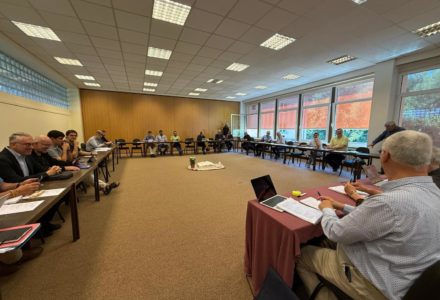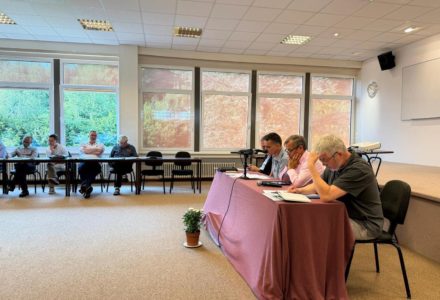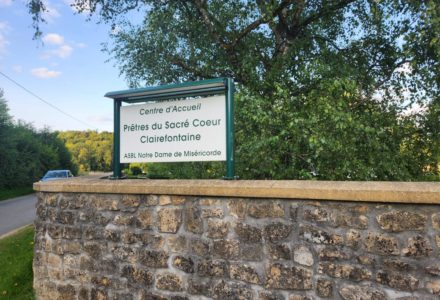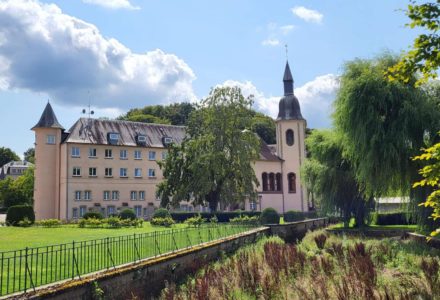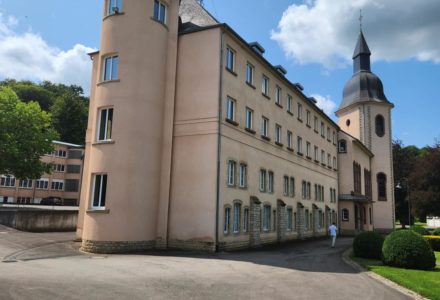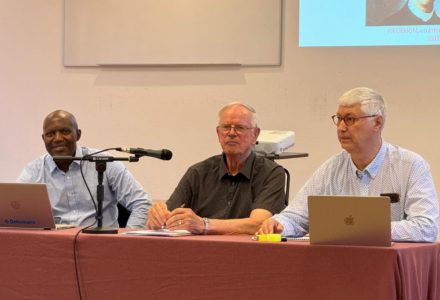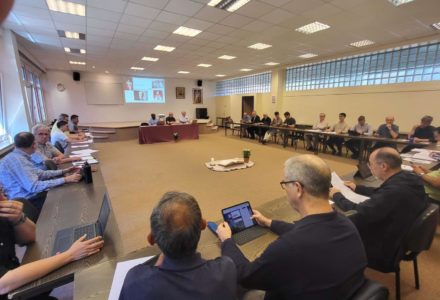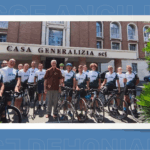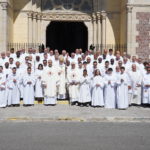The theological seminar in Clairefontaine, held from August 6 to 8, 2025, on the occasion of the centenary of Father Dehon’s death, explored his social legacy through a hermeneutical study of his texts.
The Spiritual Center of Clairefontaine
This was the title of the theological reflection days preceding the centenary celebration of Father Dehon’s death. The seminar took place in Clairefontaine, on the Belgian-Luxembourg border, a historic site for us Dehonians, as the Clairefontaine reception center is the oldest active community of the congregation. Historically, this location was purchased by our founder himself in 1889, where he established an apostolic school intended to train future members of the congregation. Students completed secondary studies before entering religious life. This school operated until 1986, forming many religious, clergy, and intellectual and cultural figures.
The seminar saw participation not only from the Superior General and some members of his Council but also from representatives of other SCJ provinces worldwide. The warm welcome from the Clairefontaine confreres, who even fetched participants from Luxembourg airport or Arlon train station, reinforced the “We Congregation” spirit. The days were shared between prayer, especially the Eucharist, time for reflection, meals, and most notably convivial encounters during aperitifs and coffee breaks. Special thanks were given to the center director, Father Antoine Do, Superior Jean-Jacques Flammang, and all members of the Clairefontaine community for their hospitality, as well as to the European Theological Commission for leading the work.
The Work
The seminar, focusing on the social legacy of Father Dehon over the past century, followed a particularly original approach by emphasizing participants’ discovery of Father Dehon through his texts. This hermeneutical study was preceded by presentations from various speakers, whose role was to guide participants in reading the texts. French and English were the languages used for the occasion.
Day 1: Democracy and Crises of Democracy
The first day focused on democracy and its crises, especially in the West. Antonio Teixeira, from the Venezuela province, presented “Father Dehon’s Political Discernment in the Context of the Third Republic.” This presentation introduced participants to a series of letters dated December 1887 to March 1899 concerning Étienne Lamy, a French politician of Father Dehon’s time, who formed alliances to ensure the reliability of Christian democracy. Hermeneutical analysis revealed Father Dehon not as a “homo politicus” per se, but as someone who subtly contributed to establishing the Third Republic through his correspondence.
Marco Bernardoni’s second lecture updated participants on the contemporary democratic crisis in the West through the concept of populism. Today’s democracy is challenged by groups who feel its current form no longer meets their aspirations, a phenomenon accompanied by infocracy (a system of governance based on control of information) and infodemic (an overabundance of true or false information).
Day 2: “Go to the People” – Pope Leo XIII
The second day focused on Pope Leo XIII’s famous invitation, “Go to the People.” John Van den Hengel’s lecture presented not only the context in which this expression arose but also its development and how Father Dehon interpreted it. The second lecture by Michel Simo Temgo addressed “‘Go to the People’ as an Outward-Looking Church: How to Be a Missionary Disciple Today.” Drawing on four Magisterial documents—the Aparecida Document, Apostolic Exhortation Evangelii Gaudium, Encyclical Laudato Si, and the Antiqua et Nova Note—Michel outlined the origin of the missionary disciple concept, its development under Popes Francis and Leo XIV, and the challenges facing missionary disciples today. He emphasized the urgency for the Church to go to the peripheries and the need for Dehonians to rethink their mission in light of contemporary challenges, particularly Artificial Intelligence. Should a “theology of bridges” based on dialogue and encounter, as promoted by Popes Francis and Leo XIV, not be developed?
Day 3: The Kingdom of God
The third and final day focused on the theme of the Kingdom of God. Krzysztof Napora, drawing on the first volume of Cardinal Ratzinger’s book Jesus of Nazareth: From the Baptism in the Jordan to the Transfiguration, explored how this concept is rooted in the Old Testament and develops through the New Testament, identifying Jesus with the Kingdom of God.
The seminar’s final lecture, given by Jakub Bieszczad, addressed “The Idea of the Kingdom as a Means of Communication Between the Mystical and Social Dimensions of Father Dehon’s Spiritual Legacy.” The Kingdom was presented as a potential convergence between Dehon’s social and spiritual legacy, with particular attention to the concept of reparation.
Plenary sessions allowed participants to appreciate the various contributions and perform hermeneutical work on the texts. All presentations will be published in the near future in the journal Studia Dehoniana.


